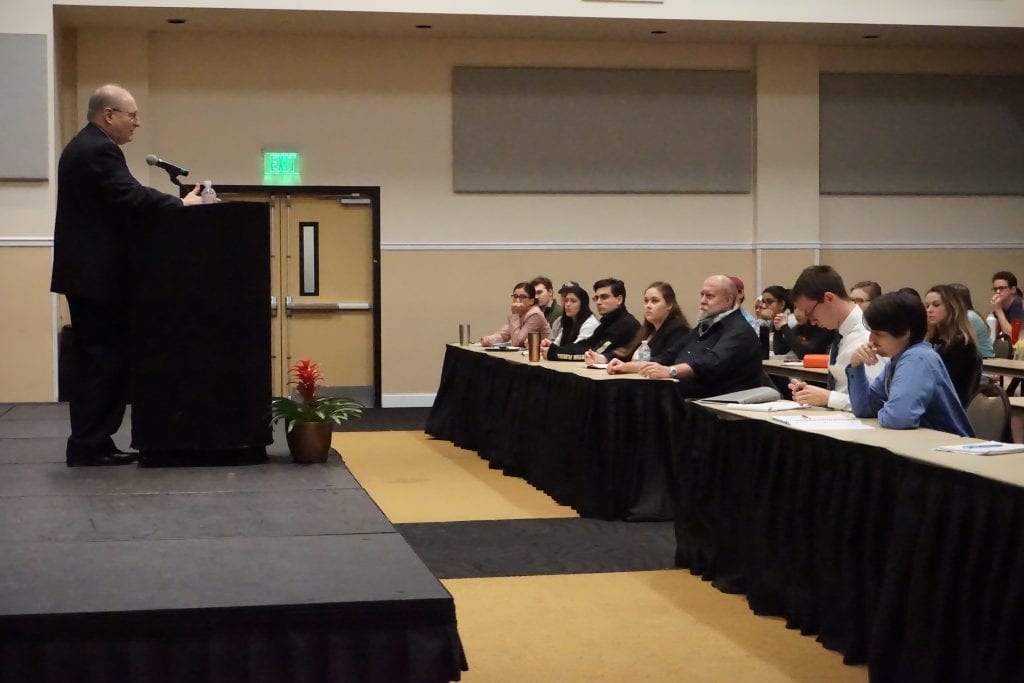Ambassador Shines Light on Middle East Challenges

On Jan. 24, Ambassador Eric S. Edelman, Ph.D., presented a puzzle to an audience of about 70 people: For an American public weary of U.S. involvement in the Middle East, why has U.S. President Donald Trump’s proposal to withdraw troops from Syria received such a negative response? In an event titled “Managing Turmoil in the Middle East,” Edelman used this puzzle to discuss a disconnect between the public’s perception of the Middle East’s importance and the emphasis experts place on the region.
Edelman is no stranger to the Middle East. He has served as U.S. Ambassador to Turkey and Under Secretary of Defense for Policy, recently authored, “Revolution and Aftermath: Forging a New Strategy Toward Iran,” and co-chairs the Bipartisan Policy Center’s Task Force on Managing Disorder in the Middle East. He currently serves as Distinguished Practitioner-in-Residence at the Philip Merrill Center for Strategic Studies at Johns Hopkins SAIS. Edelman visited UCF for campus and community meetings to discuss timely issues relating to global security, including the Middle East at this public event.
Addressing the original puzzle, Edelman discussed the history of U.S. involvement in the region, from World War II to the present. While policy goals varied among different U.S. presidential administrations, the overarching strategy has been to strategically counterbalance hostile powers and protect U.S. interests and allies. Examples he gave included helping secure oil resources for Europe after WWII to decreasing the region’s reliance on Soviet coal; having military bases where U.S. aircraft could refuel in the event of a war with the former USSR; and the Carter doctrine that limited Iran’s regional hegemony such that “no hostile power controls the Gulf.”
Since the attacks on Sept. 11, 2001, and the subsequent direct military involvement in and around the region, Edelman noted that the Obama and now Trump presidential administrations have tried to shift the U.S. focus and efforts elsewhere. This begs the question, “Why is the Middle East still important?”
The answer points back to the original strategy of counterbalance and protect allies. While the U.S. is less reliant on oil imports, the Middle East still produces 50 precent of the world’s crude oil and 77 percent of all oil consumed by Japan, he said. Any disruption in Middle Eastern production of oil would lead to huge financial repercussions worldwide, as well as massive security problems for America’s closest allies.
Problems in the Middle East are also not isolated to the area. Edelman pointed to the refugee crisis currently afflicting Europe and the recent, unfortunate attack in Manbij, Syria. Edelman also noted that whenever the U.S. retreats in the Middle East, Russia has gladly filled this gap and sees the area as a market for Russian weapon systems.
Managing turmoil in the Middle East is no easy feat. Edelman left the audience with six principles to guide future U.S. policy toward the Middle East:
- Confront Sunni extremism and Iranian expansion
- Avoid new conflicts
- Pursue inclusive local governance
- Emphasize order rather than borders
- Create common purpose with allies
- Recognize that Russia is neither a cause of turmoil nor a solution to it
After his speech, Edelman took questions from the audience. One man asked if dividing Iraq along tribal lines would help ease tensions. Edelman explained those lines do not overlap with sectarian lines and would thus not help create harmony there. Another person asked whether the U.S. is the only country capable of helping the area. Edelman replied that the U.S. possesses global reach and is the only nation which is friendly with both Israel and Saudi Arabia, two huge players in the area.
Edelman’s visit was hosted by the Global Perspectives Office, and made possible with support from the Lester N. Mandell Endowed Distinguished Lecture Series, the Orlando Area Committee on Foreign Relations, the UCF College of Sciences, UCF’s Center for Global Economic and Environmental Opportunity, and the Global Connections Foundation. For more information about this event and related events, please visit www.ucfglobalperspectives.org.
